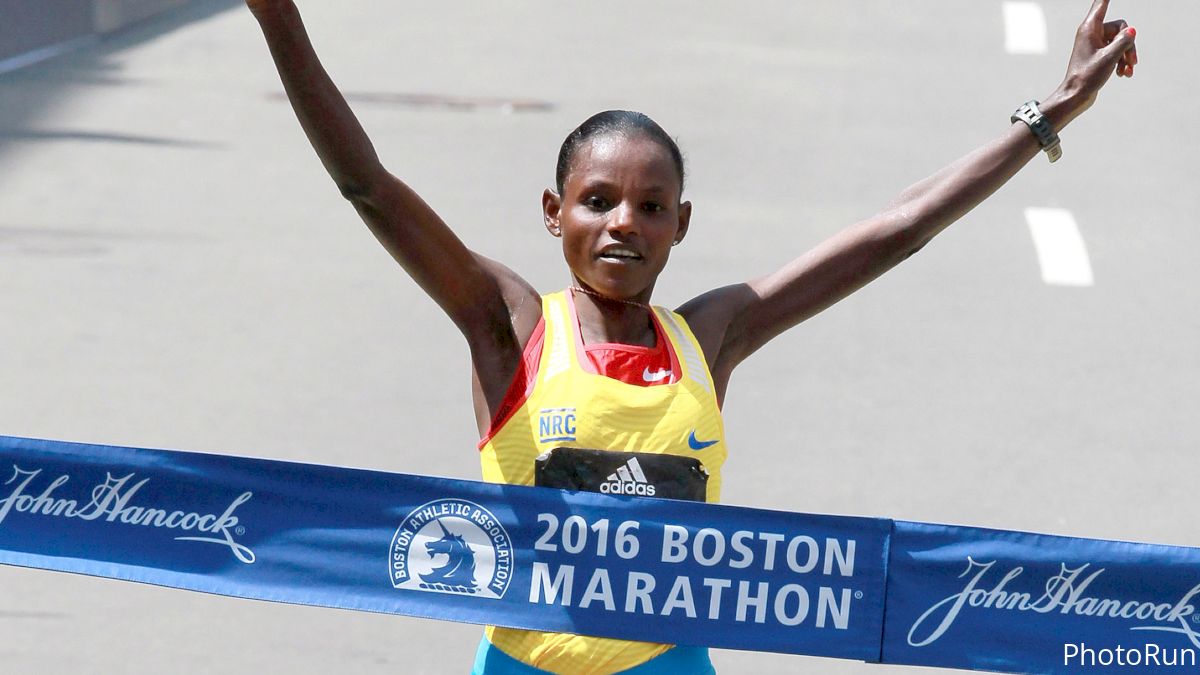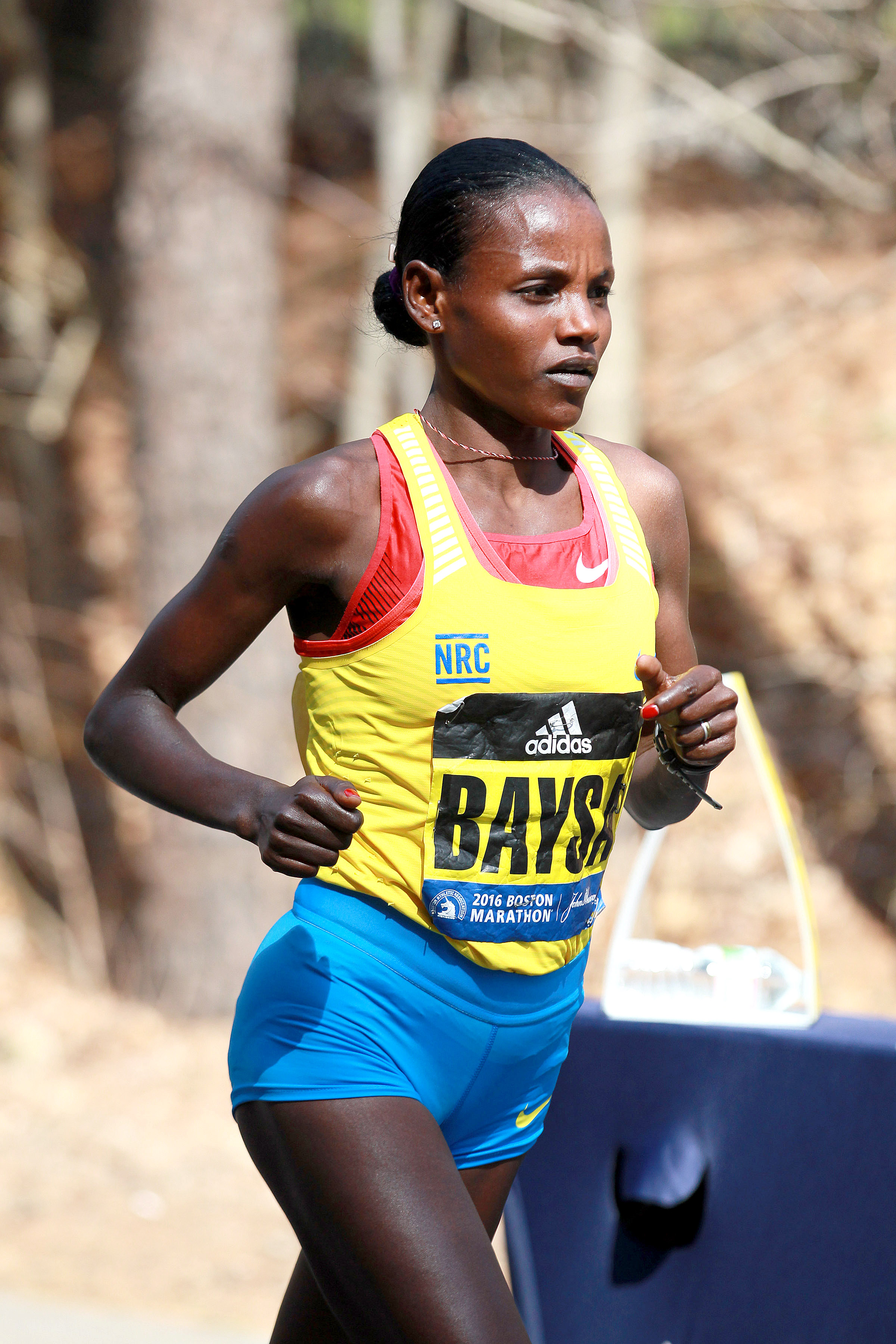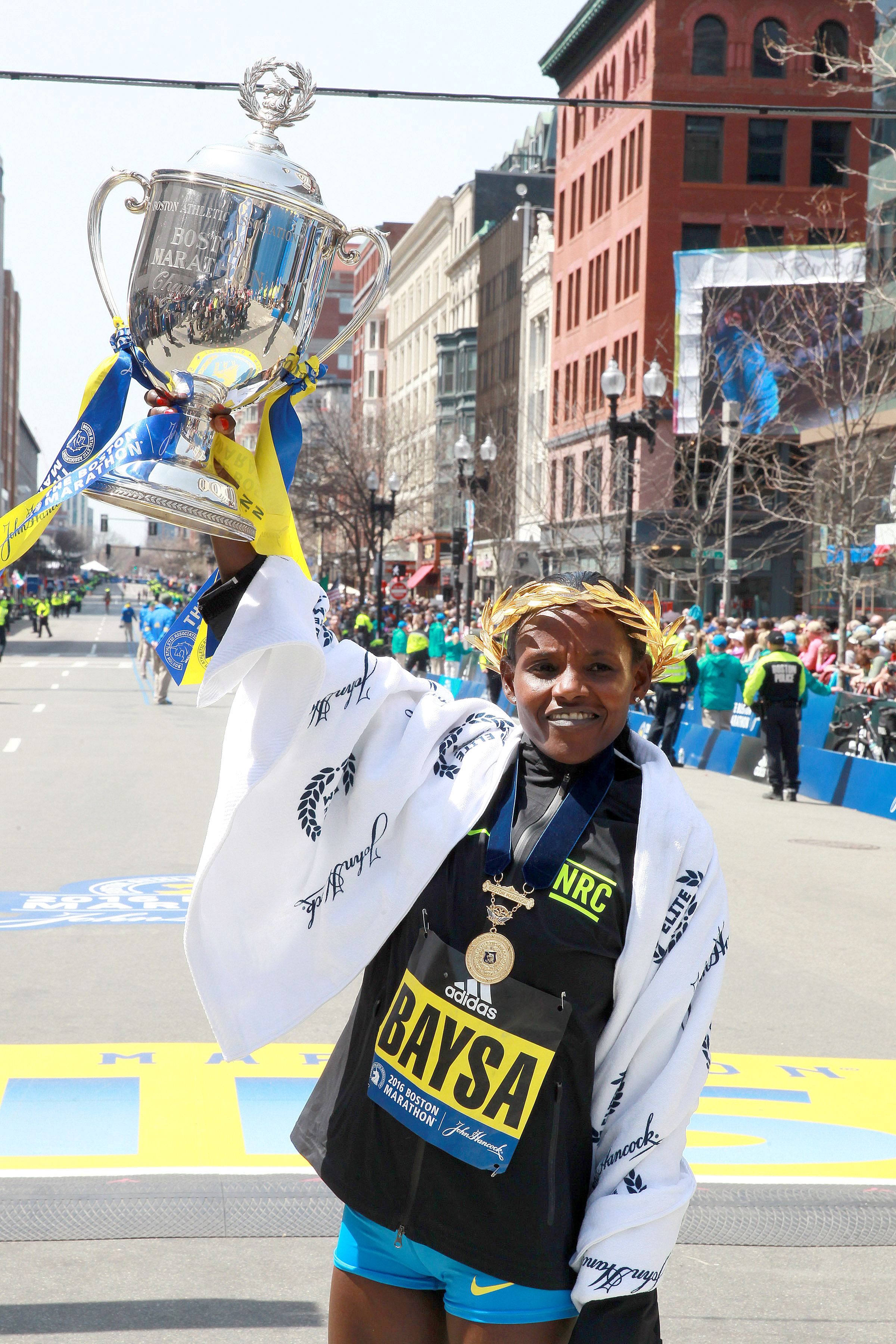2016 Boston Marathon & B.A.A. 5k/MileApr 19, 2016 by Taylor Dutch
How Atsede Baysa Won The Boston Marathon
How Atsede Baysa Won The Boston Marathon
By Sarah BarkerWinning Monday’s Boston Marathon was a slam dunk for Ethiopian Atsede Baysa: Her late-race freight train charge from the back of beyond provi

By Sarah Barker
Winning Monday’s Boston Marathon was a slam dunk for Ethiopian Atsede Baysa: Her late-race freight train charge from the back of beyond provided some excitement in an otherwise routine event; she got the win and the $150,000 prize; and she really shined up her chances of being chosen for one of the three spots on Ethiopia’s Olympic marathon team. Not bad for a modest 2:29:19 clocking, seven minutes off her best.
The 29-year-old used her head and ten years of marathoning experience as much as her physical fitness to prevail over a field of women with equal or better resumes. Unlike most major marathons, Boston does not have pacemakers, runners whose job it is to take the lead pack through usually 18 miles or so at even, prescribed splits. It’s proven to be the most efficient recipe for a fast, if not particularly exciting, finish time. It was very warm—in the 70s for most of the race—so with the thought of the infamous Newton hills in mind, a large lead pack, Baysa among them, jogged through halfway in 1:15, and even further, to about 25K.

BOSTON MARATHON: MILE-BY-MILE BREAKDOWN
The slow pace that far into the race guaranteed a modest finish time, but more relevant at Boston, it meant at least twelve lead women should have had plenty left in the tank, and were just waiting to use it. The race was fellow Ethiopian Tirfi Tsegaye’s to lose, as she had the fastest PR in the field by almost three minutes, but oddly, it was Kenyan Valentine Kipketer, with a 2:23 PR, probably benefiting from the slow pace, who broke up the tea party with a furious 5:00 downhill 16th mile. Three women went with her—Tsegaye, Kenyan Flomena Daniel, and Kenyan Joyce Chepkirui. Baysa did not, and very quickly disappeared from TV screen view.
Baysa’s splits reveal remarkably steady mile paces of 5:40, 5:42, slowing even at 21 miles to 5:50. This put her 37 seconds back from the lead pack of four, running on her own. Had the pace up to that point been faster, dropping that far back from the leaders would have been a death sentence, a one-way slide. In a fast-paced race, it’s rare, if not impossible, to increase pace after 22 miles. Sometimes, a runner who’s fallen back can maintain her pace and pass those who are fading even more dramatically, but that’s best case scenario in a fast race.
Boston having been relatively slow, Baysa was not unduly stressed, and was able to assess her circumstances in the comfort and privacy of her own living space on the course. When she looked into the tank and kicked her metaphorical tires, she must have been pretty encouraged by what she found. A little mental math told her if she was going to go, now was the time—had she waited until 23 or 24 miles, even her top mile speed would not have been sufficient to catch Tsegaye and Chepkirui, she was that far back. So, at 22 miles, Baysa went. She covered the 35K to 40K stretch in 16:43, more than a minute faster than any other 5K segment, a pace that would have been impossible for her had the first 35K not been so gentle.
The leaders, Tsegaye and Chepkirui, covered 35K and 40K in 17:27, which was enough to drop both Flomena Daniel and Valentine Kipketer, though it was only 30 seconds faster than the previous 5K. Neither Tsegaye nor Chepkirui seemed ready or able to pick up the pace significantly, and hold it for the final four miles, but Tsegaye, who trains with Baysa, was aware that somewhere behind them someone else was ready and able.
Race announcers commented on how frequently Tsegaye swiveled around, looking for the likely threat to appear. Slow pace notwithstanding, Tsegaye must have been out of gas. If she’d been able, she would not have wasted time and energy looking for the attack, but would have pre-emptively shut it down with a surge. Instead, she watched helplessly as Baysa’s bright yellow jersey closed and blew by with final authority.
 Baysa won by 44 seconds, making up almost a minute-and-a-half in the last four miles. While there have been some exciting come-from-behind finishes—Uta Pippig made up 30 seconds on Tegla Loroupe to win the 1996 Boston Marathon, and my favorite, Berhane Adere came back on Adriana Pirtea like a bird of prey to win the scorching 2007 Chicago Marathon—but the number of really talented women marathoners makes that occurrence increasingly rare. In a demonstration of the cruel vagaries of marathoning, Tsegaye finished in second, in 2:30:03, more than 10 minutes off her PR.
Baysa won by 44 seconds, making up almost a minute-and-a-half in the last four miles. While there have been some exciting come-from-behind finishes—Uta Pippig made up 30 seconds on Tegla Loroupe to win the 1996 Boston Marathon, and my favorite, Berhane Adere came back on Adriana Pirtea like a bird of prey to win the scorching 2007 Chicago Marathon—but the number of really talented women marathoners makes that occurrence increasingly rare. In a demonstration of the cruel vagaries of marathoning, Tsegaye finished in second, in 2:30:03, more than 10 minutes off her PR.
Ethiopia selects athletes for their Olympic team based on recent performances, which is why both Boston and the April 24 London Marathon are thick with athletes from that country essentially auditioning for a spot. Though her time is unremarkable for an elite runner, Baysa’s strategically smart effort in a pacer-less race on a hot day—the Olympic marathon will be pacer-less and probably hot—certainly lifted her in the ranks.
Winning Monday’s Boston Marathon was a slam dunk for Ethiopian Atsede Baysa: Her late-race freight train charge from the back of beyond provided some excitement in an otherwise routine event; she got the win and the $150,000 prize; and she really shined up her chances of being chosen for one of the three spots on Ethiopia’s Olympic marathon team. Not bad for a modest 2:29:19 clocking, seven minutes off her best.
The 29-year-old used her head and ten years of marathoning experience as much as her physical fitness to prevail over a field of women with equal or better resumes. Unlike most major marathons, Boston does not have pacemakers, runners whose job it is to take the lead pack through usually 18 miles or so at even, prescribed splits. It’s proven to be the most efficient recipe for a fast, if not particularly exciting, finish time. It was very warm—in the 70s for most of the race—so with the thought of the infamous Newton hills in mind, a large lead pack, Baysa among them, jogged through halfway in 1:15, and even further, to about 25K.

BOSTON MARATHON: MILE-BY-MILE BREAKDOWN
The slow pace that far into the race guaranteed a modest finish time, but more relevant at Boston, it meant at least twelve lead women should have had plenty left in the tank, and were just waiting to use it. The race was fellow Ethiopian Tirfi Tsegaye’s to lose, as she had the fastest PR in the field by almost three minutes, but oddly, it was Kenyan Valentine Kipketer, with a 2:23 PR, probably benefiting from the slow pace, who broke up the tea party with a furious 5:00 downhill 16th mile. Three women went with her—Tsegaye, Kenyan Flomena Daniel, and Kenyan Joyce Chepkirui. Baysa did not, and very quickly disappeared from TV screen view.
Baysa’s splits reveal remarkably steady mile paces of 5:40, 5:42, slowing even at 21 miles to 5:50. This put her 37 seconds back from the lead pack of four, running on her own. Had the pace up to that point been faster, dropping that far back from the leaders would have been a death sentence, a one-way slide. In a fast-paced race, it’s rare, if not impossible, to increase pace after 22 miles. Sometimes, a runner who’s fallen back can maintain her pace and pass those who are fading even more dramatically, but that’s best case scenario in a fast race.
Boston having been relatively slow, Baysa was not unduly stressed, and was able to assess her circumstances in the comfort and privacy of her own living space on the course. When she looked into the tank and kicked her metaphorical tires, she must have been pretty encouraged by what she found. A little mental math told her if she was going to go, now was the time—had she waited until 23 or 24 miles, even her top mile speed would not have been sufficient to catch Tsegaye and Chepkirui, she was that far back. So, at 22 miles, Baysa went. She covered the 35K to 40K stretch in 16:43, more than a minute faster than any other 5K segment, a pace that would have been impossible for her had the first 35K not been so gentle.
The leaders, Tsegaye and Chepkirui, covered 35K and 40K in 17:27, which was enough to drop both Flomena Daniel and Valentine Kipketer, though it was only 30 seconds faster than the previous 5K. Neither Tsegaye nor Chepkirui seemed ready or able to pick up the pace significantly, and hold it for the final four miles, but Tsegaye, who trains with Baysa, was aware that somewhere behind them someone else was ready and able.
Race announcers commented on how frequently Tsegaye swiveled around, looking for the likely threat to appear. Slow pace notwithstanding, Tsegaye must have been out of gas. If she’d been able, she would not have wasted time and energy looking for the attack, but would have pre-emptively shut it down with a surge. Instead, she watched helplessly as Baysa’s bright yellow jersey closed and blew by with final authority.
 Baysa won by 44 seconds, making up almost a minute-and-a-half in the last four miles. While there have been some exciting come-from-behind finishes—Uta Pippig made up 30 seconds on Tegla Loroupe to win the 1996 Boston Marathon, and my favorite, Berhane Adere came back on Adriana Pirtea like a bird of prey to win the scorching 2007 Chicago Marathon—but the number of really talented women marathoners makes that occurrence increasingly rare. In a demonstration of the cruel vagaries of marathoning, Tsegaye finished in second, in 2:30:03, more than 10 minutes off her PR.
Baysa won by 44 seconds, making up almost a minute-and-a-half in the last four miles. While there have been some exciting come-from-behind finishes—Uta Pippig made up 30 seconds on Tegla Loroupe to win the 1996 Boston Marathon, and my favorite, Berhane Adere came back on Adriana Pirtea like a bird of prey to win the scorching 2007 Chicago Marathon—but the number of really talented women marathoners makes that occurrence increasingly rare. In a demonstration of the cruel vagaries of marathoning, Tsegaye finished in second, in 2:30:03, more than 10 minutes off her PR.Ethiopia selects athletes for their Olympic team based on recent performances, which is why both Boston and the April 24 London Marathon are thick with athletes from that country essentially auditioning for a spot. Though her time is unremarkable for an elite runner, Baysa’s strategically smart effort in a pacer-less race on a hot day—the Olympic marathon will be pacer-less and probably hot—certainly lifted her in the ranks.